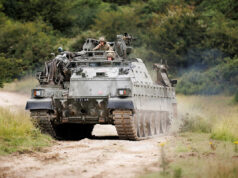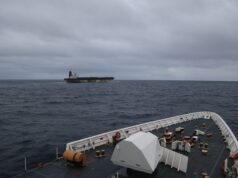A boost to UK arms companies and their suppliers may be delivered by BREXIT.
Guy Anderson, senior principal analyst at IHS Jane’s, said:
“The 2pc defence spending target every year until 2019 will likely be retained as achieving such a ratio will become that much easier given lower rates of economic growth.
This and the level of political capital the Conservative government has invested in the UK fulfilling NATO obligations means we project the MoD budget will continue to account for over 2pc of GDP for the remainder of this parliament.”
Britain will soon confirm the first orders from US company Boeing for the P-8 maritime patrol aircraft and upgrades to the Apache helicopter fleet at the Farnborough airshow later this month.
Britain is also buying the F-35B fighter and this could become more expensive. According to the Telegraph, another upside to Brexit is that Britain is likely to be freed from EU procurement rules, allowing the MoD to focus its spending on domestic companies. A weaker pound will also make British-made arms cheaper to buyers, meaning they will get more for their money.
The French Defence Minister has stated that defence ties between the UK and France will remain in place following BREXIT.
French Defence Minister Jean-Yves Le Drian said:
“Brexit will not damage in any way the extremely strong defence cooperation that we have with Britain. This partnership exists and will continue to exist. The British Minister (Michael Fallon), who I met this morning, has confirmed this shared wish to continue with this very strong cooperation.â€
His comments follow US Secretary of State John Kerry predicting “an even stronger NATO going forwardâ€.
“We have high expectations of a very strong NATO meeting and important deliverables. That will not change one iota as a consequence of the vote that has taken place.â€
In Brussels Kerry met NATO Secretary General Jens Stoltenberg.
“After the UK decided to leave the European Union I think that NATO has become even more important as a platform for cooperation between Europe and North America but also defence and security cooperation between European NATO allies.â€
A House of Commons briefing paper claims that the direct impact of BREXIT on the UK armed forces is minimal.
The briefing paper states:
“The EU may feel the loss of the UK more acutely because the UK is one of Europe’s largest military powers and is one of the few EU countries capable of taking command of a mission. A UK exit could potentially leave the EU with fewer assets and capabilities at its disposal, although the UK could choose to contribute to EU military missions as a third party state.
Arguably the biggest impact will be a reduction in the UK’s ability to influence the direction of travel for European defence. Exit from the EU will remove one of the strongest voices opposing further defence integration and the creation of what is commonly called a ‘European Army’.â€
Further, it is claimed that:
“Exit from the EU will not prohibit the UK from working closely with individual European nations to jointly procure equipment, exercise or deploy together on military operations. Withdrawal negotiations will decide whether the substance of two EU defence directives are retained. These directives are designed to make the EU internal defence market work better and to increase competition in the EU defence sector. Major UK defence companies argued before the vote in favour of Remain.
The prospect of a second referendum on Scottish independence will reignite the debate about the location of the UK’s strategic nuclear deterrent, Trident. The Scottish Government opposes its presence in Scotland. The UK Government has promised a vote on the renewal of the deterrent but no date has been given.â€
NATO is a security alliance of 28 North American and European states, established by the North Atlantic Treaty in 1949. NATO’s fundamental role is to protect the freedom and security of its member states.
Britain in NATO is pivotal to the alliance. The alliance may be American-led and American-dominated, but Britain remains a vital anchor. Not only are we a fellow nuclear power, we have been the staunchest and closest military ally of the US, in terms of intelligence sharing, battlefield operations and interoperable hardware allowing the whole alliance to benefit.
Douglas Hurd of the Royal Institute for International Affairs said:
“NATO is one of the principal props which have allowed Britain to punch above its weight in the world.â€
Under the auspices of NATO, the United Kingdom has been active around the world and has played a leading role in many conflicts.













EXCELLENT…
It will all come good, just give it time
Lol
I believe we are now starting to see the signs of what will be a formidable defence package suitable to deal with any future problems that we will face.
The onus being on defence hopefully. No more illegal wars or sticking our beaks into the affairs of other countries.
Just as it should be! Quality kit for our soldiers not the cheapest! ??
“[2% of GDP on defence] – achieving such a ratio will become that much easier given lower rates of economic growth”.
“Britain will soon confirm the first orders from US company Boeing for the P-8 maritime patrol aircraft and upgrades to the Apache helicopter fleet” – anyone know what the off-set deal with Boeing is like? and I thought that AW had lost the Apache contract to Boeing Vertol.
“another upside to Brexit is that Britain is likely to be freed from EU procurement rules” – would be genuinely interested how this has effected procurement over time.
“Major UK defence companies argued before the vote in favour of Remain.” – I doubt this was for sentimental reasons!
Yeah, the whole package sounds like a real boon…
Yeah, I don’t like the 2% bit being easier. Just a cunning way to reduce spending.
Why ?
You will never leave Europe !
Back to paying £1000 for a spanner again then!
Great but only if they can sort out this division mess we have created.
good to hear
Very good article George!
It’s good to see John Kerry believes that NATO will get stronger and that France remains a strong defence partner despite us leaving the EU!
Will the British armed forces size be smaller or bigger now? Leaving the EU means we need to guard the borders? So should we maybe increase the Armed Forces and then include National conscription :0?
There are no “EU procurement directives” for defence you nit wit.
http://ec.europa.eu/growth/single-market/public-procurement/rules-implementation/defence_en
It might help the UK economy offset the investment slowdown due to Brexit but it doesn’t help UK defence spending. OK, BAE gets more business but how is that different to Unilever or Astra Zeneca or some small manufacturer in Birmingham getting a boost in exports? A company getting more export orders doesn’t translate to the UK being able to spend more on defence.
I personally think it should be 2% of our forces in Nato. Why? Because not only is 2% of GDP a burden the cost of sending our forces and the stretch which is so evidently seen when we are in operations.
1) defence of our island and skies/ disaster relief
2) Nato membership.
3)fighting terrorism and continued involvement of legacy conflicts I.e Iraq,afghan,Syria,lbyia
4)fighting piracy and drug trafficking.
5) the immediate top up of the eastern flank to deter Russia.
Our Navy and RAF are stretched to the limited not to mention the disastrous SDR of 2010.
It’s about bloody time the African continent gets its finger out and it’s about bloody time Europe gets its act together.
Guys, the UK is in a dark place and who knows the impact a split on the union could have on the MOD and the amount of walk outs if any by English or Scottish nationals.
Then theres the issue of budget and the divvy up of of bases and hardware.
I genuinely hope our leaders have a strategic approach not only to brexit but to a possible split of the uk also.
We need time to reflect on foreign policy past and present but most importantly the UK needs to be heading in the same direction which evidently it hasn’t been for sometime.
We don’t have a government at present to deal with domestic matters never mind a crisis abroad and nor do we have a military size and capability to protect US from political and military threat.
James Bailey-Gray
it seems that some arguments cancel out each other 🙂
They were saying defence cuts???
I’m expecting one of the carriers to be sold or mothballed following Brexit.
No, that’s not likely.
I really hope not but if the economy takes a dive as predicted post Brexit defence is always the first to suffer with cuts.
Lets have national service aswell
“The 2pc defence spending target every year until 2019 will likely be retained as achieving such a ratio will become that much easier given lower rates of economic growth.”
– So they are telling you it will be easier to maintain the 2% defence budget because we will be in recession. Lol.
Full steam ahead
Kate…
I’m not an arms company
And it won’t boost us ?
I know a bloke who can get you started for 50 quid cih
This was on the cards before the Euro vote if the UK voted out
Norman Soutar
More work for the ungrateful sturgeon clan??
So by UK defence companies do they mean BAE ? When would it be appropriate to panic ?
Britain needs to look after its self now…
And I personally wouldn’t mind paying more tax if the money goes into the UK (or England’s) defensive strategies.
The way we should look at this is the money the government spends on defence in this country isn’t the real cost…
It’s recycled if you like (partially), the government pays the defence contractor who pays the labor force who put it back into the economy…
As long as we buy British!